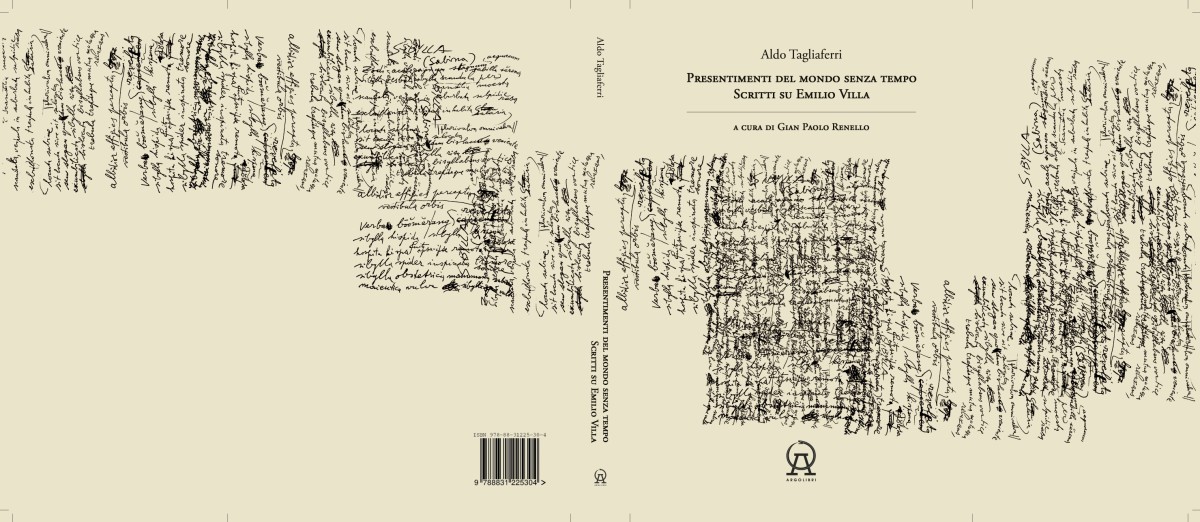
- This event has passed.
Presentazione libro Presentimenti del mondo senza tempo. Scritti su Emilio Villa
30 May 2022-18:00

30th may 2022
START 6.00 p.m.
Casa Morra. Archivi d’Arte Contemporanea
Salita San Raffaele 20/c, 80136 Naples
Book preview to present
Presentimenti del mondo senza tempo. Scritti su Emilio Villa
by Aldo Tagliaferri
curated by Gian Paolo Renello
Monday 30 May 2022 at 6pm: Gian Paolo Renello previews Aldo Tagliaferri’s Presentimenti del mondo senza tempo. Scritti su Emilio Villa (Argolibri editore, Ancona, 2022), a volume of essays dedicated to Emilio Villa. The speakers will be Gian Paolo Renello, the editor of the volume, and Giancarlo Alfano, Professor of Italian Literature at the Federico II University of Naples.
The volume brings together for the first time all the essays and the principal writings Aldo Tagliaferri has dedicated to Emilio Villa in over 40 years of sharp criticism. With this compendium of a life’s work in pursuit of Villa’s labyrinthine and sibylline poetics, Aldo Tagliaferri, one of the leading living critics, has produced what is, perhaps, his most important book, a text that will surely become a classic of literary criticism, an indispensable key to the kaleidoscopic oeuvre of Villa’s genius and the cultural processes of hybridization and change that took place in the second half of the twentieth century in Italy and abroad. The volume, edited by Gian Paolo Renello, consists of sixteen essays and a video interview entitled Esprimere l’inesprimibile (Expressing the Inexpressible), which can be accessed through the QR code inside the book, edited by Giuseppe Sterparelli and Gian Paolo Renello. It contains priceless unpublished documents, including two of Villa’s Labyrinths and a postcard from Marcel Duchamp to his friend “Villadrome”. The book comes out at a time critic Andrea Cortellessa has rightly defined the “Villa-Renaissance”. Countless exhibitions showcasing Villa’s works were held in 2021 in Rome, Macerata, and other cities, in addition to conferences in Italy and abroad (work is ongoing to set up an international study centre). Hitherto unknown works and new studies are currently being published, including Rovesciare lo sguardo. I Tarocchi di Emilio Villa, edited by Bianca Battilocchi, also by Argolibri, in 2021.
“When, in some histories or anthologies of Italian poetry, cancellation has been replaced by hasty additions, the patch has often proved to be a greater problem than the void it was meant to remedy, bringing out the flat, historic and uncritical nature of handbooks, regarding which publishers, chronic latecomers, wish above all to appear à la page. The objective difficulty facing a reader grappling with an oeuvre dispersed across so many publications appearing in limited editions, mostly privately, has been circumvented effectively and convincingly by poets who, despite their mutual incompatibility, found something with which to engage in the texts available. This was not the case of Montale, who was perhaps dulled by the hybris to which Nobel Prize winners are susceptible, nor of Sanguineti, set on an improbable marriage between artistic avant-gardism and Marxism-Leninism. However, it did happen, for example, with Adriano Spatola in 1975, Giovanni Raboni in 1989, Lello Voce in 1994, and Andrea Zanzotto in 1998. Zanzotto, the most tireless follower of the vicissitudes of Villa’s poetry over the years, had formed firm convictions on his work. When I sent him a copy of Niger Mundus in 2006, he commented: ‘It is a pity that jewels such as these are estranged from large-scale distribution. In Villa’s case, however, the more he disappears, the more you find him…’ (the suspension points are Zanzotto’s)”.
(From A. Tagliaferri, “Prolegomeni villiani”, in Presentimenti del mondo senza tempo. Scritti su Emilio Villa, Argolibri editore, Ancona, 2022)
Emilio Villa (b. Affori, 21 September 1914, d. Rieti, 14 January 2003). An artist, poet, essayist and biblical scholar, Villa was interested in linear, concrete-visual, and sound-visual poetry and art; he is considered a precursor of the neo-avant-garde and one of the greatest poets of the 20th century. He was in touch with Matta, Duchamp, and Rothko, also working with Italian artists such as Burri, Novelli, Turcato, and Schifano. In the 1950s, he experimented with multilingualism, mingling French, English, Provençal, Latin, Greek, Semitic languages, and Lombard dialects. With a strong dislike for the ‘Ytalyan’ language (which he considered one of slavery), he sought to create interactions between dead languages and living ones through his profound knowledge of etymology. He contributed to several art and literature magazines, including Meridiano, Letteratura, Malebolge, and Documento Sud. He also founded two highly important reviews: Ex and Appia Antica. With small publishers and galleries, he produced several limited editions of books and booklets on the art of poetry. Feltrinelli published his collection of essays on art, Attributi dell’arte odierna 1947-1967, in 1970. The posthumous, and still incomplete, L’opera poetica, edited by Cecilia Bello Minciacchi, for L’Orma editore, is forthcoming. Edizioni Morra has published the following: Comizio millenovecentocinquanta3 (1978), Sì, Ma Lentamente (1997), Baptêmes (1997), Le Mura di Tebe (2000), Scritti Napoletani (2003), and Mondo Nero – Niger Mundus (2005).
Aldo Tagliaferri is the author of Beckett e l’iperdeterminazione letteraria (Feltrinelli, 1977), L’estetica dell’oggettivo (Feltrinelli, 1968), L’invenzione della tradizione (Spirali 1985), Il Taoismo (Newton&Compton, 1996), La via dell’impossibile. Le prose brevi di Beckett (Edup, 2006), Il clandestino. Vita e opere di Emilio Villa (Mimesis, 2016). As editor, he has published Lettere di Ezra Pound (Feltrinelli, 1980) and Samuel Beckett’s Trilogia (Einaudi, 1996), and, with Giorgio Barbaglia, he published Uno e due. Indagini sul teatro dell’onnipotenza (Sipiel, 1998). With Edizioni Morra he edited POST SCRIPTUM nel centenario della nascita di Emilio Villa (2014), and, with Chiara Portesine, Emilio Villa e i suoi tempi. Finestre per la monade (Mimesis, 2016).
Gian Paolo Renello is the author of Italian Poetry 1950-1990 (Dante University Press, 1996), with Gayle Ridinger. He is editor of Segnare un secolo. Emilio Villa: la parola, l’immagine (DeriveApprodi, Rome, 2007) and author of Machinae. Studi sulla poetica di Nanni Balestrini (CLUEB, Bologna, 2010).
